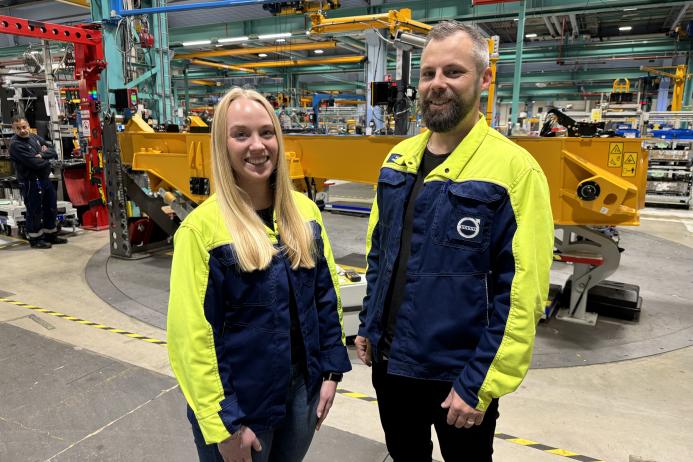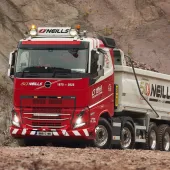Volvo CE set new sustainability benchmark at Braås
Home of company’s articulated dumptruck production achieves Climate Efficient Site certification
AS one of the construction industry’s most active drivers of sustainable transformation, Volvo Construction Equipment (Volvo CE) say they aim to inspire change by sharing steps in their decarbonization journey.
This week, Volvo CE announced that their Braås facility in Sweden is the first to achieve the company’s new Climate Efficient Site certification, meeting stringent CO2 reduction requirements set to ensure their production sites worldwide make tangible advancements towards Science Based Targets.
The Climate Efficient Site certification is the latest achievement for the Braås site, which, besides being recognized as the inventor of the articulated hauler in 1966 and long-standing world leader in the category, also boasts a strong history of leading in manufacturing sustainability.
Braås was the first in the construction industry to achieve a carbon neutral operation back in 2014, leveraging renewable energy sources such as a district heating system powered by 100% renewable biofuels and electricity from hydropower. In 2018, the site was declared landfill-free. Now, a new benchmark is being set.
To fulfil Volvo CE’s commitment to the Science Based Target initiative and overall sustainability strategy, the company is transforming across all parts of its business. This global internal certificate is designed to provide all production sites with a stretch goal to help the company meet its Science Based Targets commitments and covers all of scope 1 and 2, and scope 3 emissions that are within the site’s ability to influence. The extensive requirements cover not only direct and indirect emissions to the site; emissions generated in the production of goods, services, and fuels; but also energy and waste management.
Melker Jernberg, president of Volvo CE, said: ‘Our commitment to drive the decarbonization of construction remains firm, which is why we constantly push ourselves to set new benchmarks for sustainability beyond the industry status quo. We believe in leading by example with concrete action, starting with ourselves. The employees at Braås keep demonstrating what can be achieved with clear targets and a culture of learning and involvement, where everyone is enabled and encouraged to make meaningful contributions.’
The main groundwork in Braås was a comprehensive inventory of all carbon emissions connected to site activities across its approximately 60,000m2 of manufacturing buildings and offices. This mapping helped its nearly 1,000 employees to actively engage in targeted continuous improvements throughout manufacturing, energy systems, materials handling, product testing, waste management, and transport and distribution.
Lisa Krondahl, environment engineer at Volvo CE in Braås, said: ‘Change is possible when people are dedicated to continuously seek improvements and act on them, and here people really want to make a difference. In 2023, we aimed for 40 environmental and energy improvements – our teams topped 120. This year we set the target to find 100 more ways to improve, and to date over 140 have been implemented. Sustainability is embedded in our teams, our processes, and the way we operate, and it guides our decision making.’

The Braås site has been running on renewable energy for many years, but the certification requirements helped discover new ways to level up its energy management. Mattias Hermander, energy expert at Braås, said: ‘It’s important to continue working to reduce and optimize the energy systems, to enable the renewable energy to be used in the best way. An energy-efficient industry is an investment in a better society, taking responsibility for our resources now and in the future.’
Other initiatives to reduce emissions at the site include:
Using only biofuels (HVO 100) for machines produced and used at the site
Collaborating with suppliers and contractors to improve work practices and inbound logistics
Enhanced waste management, focusing on waste reduction, sorting, and removal, as well as reusing and recycling
Improved quality of wastewater to allow the sludge to be used as fertilizer after treatment
Enhanced paint process, eg using abatement technology
Installing electric charging points and promoting ride-share programmes to help employees commute and travel more sustainably.
The sustainability advancements at Braås have progressed alongside expansion at the site to accelerate the phased shift to electromobility for articulated haulers. This is part of Volvo CE’s major global investment strategy to transform its facilities for electrification.










